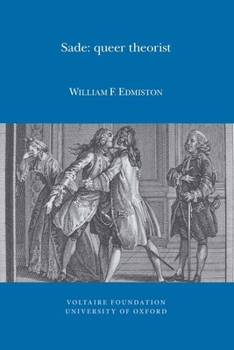Sade: Queer Theorist
In an era when both Church and State assigned gender roles and defined sexual practices in terms of male/female, lawful/illicit, Sade's extensive accounts of sexual activity were categorized as deviant, prurient or provocative. William F. Edmiston explores how Sade's unique challenge to sexual, moral and social taboos anticipates the discourses of queer theory.
Following an overview of queer theory, Edmiston examines the categories of sex, gender and sexuality as treated in some of Sade's best- and lesser-known works. He demonstrates the extent to which Sade erodes the boundaries of sexual opposition through discourses justifying rather than illegitimizing 'unlawful' sex. The author reveals the coexistence of two competing discourses on sexuality: a proclivity that cannot be eradicated, and a habit that one can choose to adopt. This pioneering re-reading culminates with an examination of how recent biographies attempt to force Sade into a normal/abnormal dichotomy, manipulating police reports, personal correspondence or narratorial interventions to establish (or not) the author's homosexuality. Through revealing Sade's attempts to undermine prevailing gender roles and sexual identities, Edmiston uncovers a 'queer' discourse that challenges the still common assumption that heterosexuality is exclusively natural and normative, and that nature has always prompted humans to reproduce, rather than to seek pleasure.Format:Paperback
Language:English
ISBN:0729410641
ISBN13:9780729410649
Release Date:March 2013
Publisher:Voltaire Foundation
Length:254 Pages
Customer Reviews
0 rating





